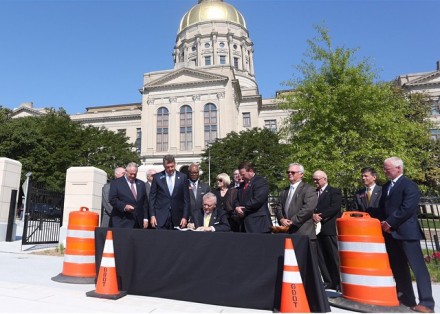
Governor Nathan Deal signed House Bill 170 in front of the Capitol Building in Atlanta today.
“Each day, Georgians set out in the pursuit of a brighter future, and it is our roads and bridges that bear the weight of our success,” said Deal. “We’ve reached the point where we can no longer keep up with the growing infrastructure demand that encourages job creation, maintains our businesses’ bottom lines and takes us home to our families. This investment reflects our modern-day population and current infrastructure usage. Today, we are ensuring that Georgia’s economic engine will remain running for generations to come. I commend the courage of the General Assembly for tackling this issue head-on and prioritizing public safety and future growth over politics.”
The new bill took “courage” from lawmakers because it institutes a sizable tax increase on each gallon of gasoline and new fees on just about every form of transportation.
The major change you’ll feel will be the switch from a combination sales tax/excise tax on gas to a flat 26 cent excise tax. With current gas prices, you’d be paying about 6 cents more in taxes per gallon.
According to Habersham County State Rep Dan Gasaway, if gas prices continue to rise, HB 170 becomes a tax decrease because it removes the sales tax that would rise or fall with the price per gallon, “I think around $2.90 a gallon is the magic number,” he says. “If gas is above $2.90, we cut taxes. If it’s below $2.90, we raised taxes.”
Gasaway and the rest of the Habersham County legislative delegation (Rep. Terry Rogers and Sen. John Wilkinson) voted in favor of HB 170. The new gas tax structure takes effect July 1st.
In addition to fuel taxes, HB 170 also added a $5 per night tax on hotel and motel rooms and a $200 annual tax on owners of electric cars. All the new taxes will bring in about half of the $1 billion the Department of Transportation says it needs each year to maintain Georgia’s roads and bridges.
The other half of the money will come from some changes in accounting at the state level.
Currently about $200 million of the gas taxes collected here completely bypass the GDOT and go into the state’s general fund instead. For years, lawmakers used that money on anything they chose; now it will all be earmarked for roads and transportation.
The new bill also brings in money from removing tax credits on alternative fuel vehicles and removing exemptions on jet fuel. All together the changes in HB 170 should bring in more than $900 million annually to the GDOT budget.
“Without this bold action taken by Georgia’s legislators, our state was at risk of falling behind,” said Deal. “The leadership demonstrated by these men and women showed a vision oriented in the future, not in the past. The steps taken were tough, but necessary, and I appreciate the hard work on all sides of the aisle in order to boost our ability to do business, and keep Georgians safe.”







